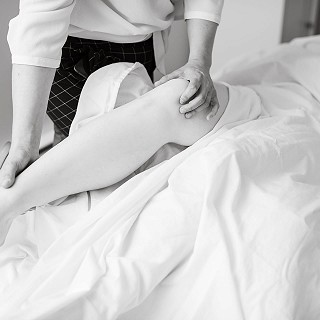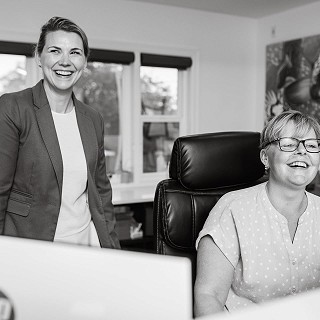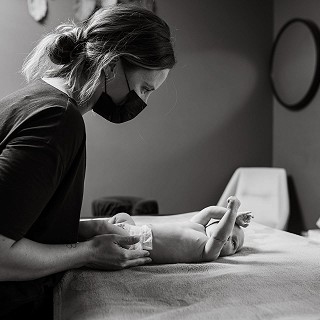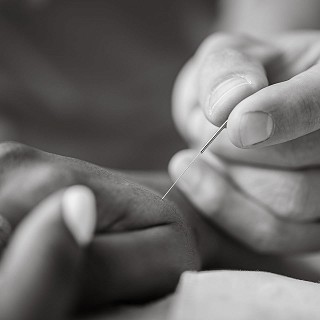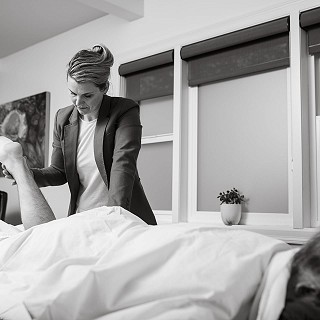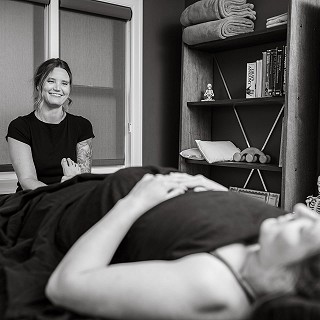What is Manual Osteopathy?
PLEASE NOTE: Osteopathic treatment is currently unavailable.
Manual Osteopathy uses a variety of techniques to address imbalances in the body. By taking a whole-body perspective, Manual Osteopathy treats muscles, bones, joints, fascia (connective tissue), and organs to achieve and maintain or improve structural balance and health.
How does Manual Osteopathy work?
Your muscles and nerves work in a specific pattern around a joint to allow movement, and our organs shift and move similarly with every breath. When your tissue layers become bound from inflammation or injury – known as adhesion – your tissues lose their ability to glide and slide (or inspir and expir) around one another. Adhesion can cause pain, decreasing the range of motion at the joints and organs.
To relieve this adhesion, Osteopathic Manual Therapists use a mixture of:
- Gentle touch
- Physical manipulation
- Stretching, and
- Massage techniques
This manual work helps to increase the mobility of joints and organs in order to relieve tension and pain. Manual Osteopathy may also promote blood and nerve supply to tissues, with the intention to help your body’s own healing mechanisms.
Manual Osteopathy FAQs
What are some common reasons to book Manual Osteopathy sessions?
Most people who see a Manual Osteopath do so for help with back pain, neck pain, shoulder pain, a feeling of being “stuck” somewhere in their abdomen, problems related to muscles or joints, or through a referral from another Allied Healthcare practitioner.
Who does Manual Osteopathy help?
Osteopathic Manual Therapists treat a wide range of health conditions, including asthma, digestive problems, and menstrual pain. Everyone from 0-120 years of age can benefit from the gentle techniques offered with Manual Osteopathy!
Where in the body is Manual Osteopathy used?
Manual Osteopathy works on the deeper internal systems and structures that allow us to move, breathe, and beat to the rhythm of life. Manual Osteopaths can work on the brain (headaches, concussion, stroke), spinal fluid, nerve tracts, the heart, the diaphragm, lungs, all the organs of digestion, pelvic organs, and muscles.
How do Manual Osteopaths get into these deeper internal systems of the body?
Gently! Manual Osteopaths have finely tuned their hands to feel the rhythm of the body systems.
How do I prepare for my Manual Osteopathy appointment?
After booking your appointment, start by filling out the intake form that is emailed to you. You are fully clothed during your assessment and treatment, so come dressed in stretchy, comfortable clothing. Be hydrated, but not too full! There is no oil or linens used, but please be prepared to flip over or have your body moved and stretched.
What training do Manual Osteopaths have?
Manual Osteopaths in Canada have over 4200 hours of training, and most practitioners usually find Manual Osteopathy as an extension of their first healthcare career. It’s not uncommon to see former RMTs, physiotherapists, chiropractors, RNs, and the occasional physician move into this field of care.
How much does Manual Osteopathy cost?
Initial sessions are $140, and are about one hour long. Subsequent appointments may be an hour or shorter, with rates ranging from $80 to $140.
Is Manual Osteopathy covered by extended health benefits?
Manual Osteopathy is covered by most extended health plans, however not all companies allow for direct billing. Please be prepared to cover the cost and submit directly to your insurance provider.
Bioenergetic testing rates
- 75 min. new patient consult + biofeedback test $270
- 30 min. returning patient consult + retest $120
- 45 min. returning patient consult + retest $180
Osteopathy rates
For further details on payment and coverage, please view our rates & payment and insurance & direct billing pages.
Staff bios
- Beverley Spidle, RMT
- Curtis Moon, RMT
- Jason Lescak, RMT
- Rahim Valli, RMT
- Sarah Pickard, RMT
- Stephanie Funk, RAc
- Tatiana Shtytcer, RMT
- Janie Ringham, RMT
- Mitchell Budd, RMT
- Brendan McCarthy, RMT
- Marissa Berger, RMT
- Dr. Man-Yee Yeung, ND
- Dr. Tonia Winchester, ND
- Elizabeth Arcand, RCRT
- Trishia Unrau, RCC
- Kate Walker, RCC
- Dr. Kristen Chila, DC

“I love going for my massages each month. They make me relaxed and have less pain from my Cerebral Palsy spasticity.”
Haley
